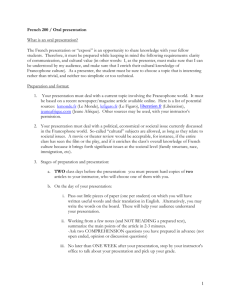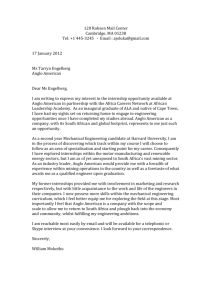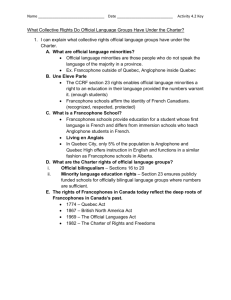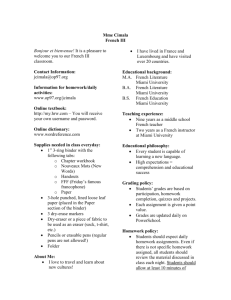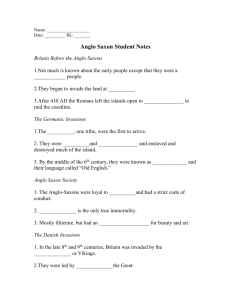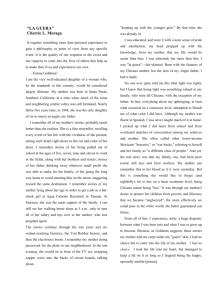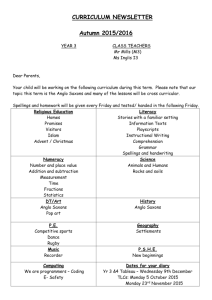13_exogamie - University of Ottawa
advertisement
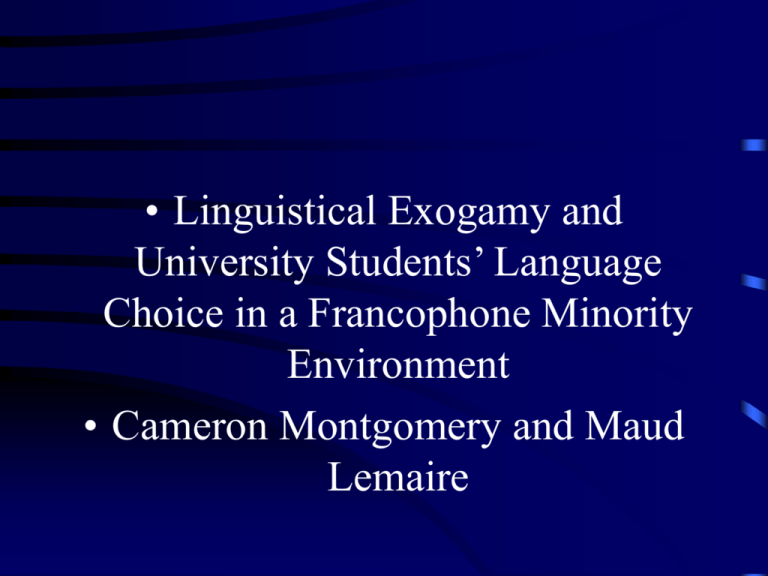
• Linguistical Exogamy and University Students’ Language Choice in a Francophone Minority Environment • Cameron Montgomery and Maud Lemaire General Context: Evolution of Linguistical Groups • 1951: francophones = -, anglophones= +. • Factors : – – – – Anglos superior to Franos (since 60s ----). Immigration (intl, prov). Language transmission (erratic; e.g.; endogamous or exogamous, community) Linguistical transfer (change : French to English). Increase in Exogamy (60s). General Context: Evolution of Linguistical Groups • 1961increase in English and French knowledge (francophones <). • Factors related to French knowledge increase: -Promotion (Educ. Sys). -Improvement of status of French (usefulness). Consequences : – Increase in bilingualism (anglos). – Increase in transmission of French (exogamous families). General Context: Evolution of Linguistical Groups • Increase (linguistical transfer French > English = 1971: exogamy increase and weak Francophone concentration). • Drop of linguistical continuity = 20-24 and 25-29 : – – – – Entering work force Marriage Leaving home Leaving secondary school… Tendency change in children=increase of French: -Promotion of French (school) -Bilingual parents General Context: Summary • Exogamy = main cause of linguistical transfer and assimilation (vs endogamous families). • Determining role of French schools = maintaining French : -Article 23 (Ont.) 1984. – Numerous studies (Landry et Allard, 1997). – Children speaking more French. – Bilingualism. Research Objective Descriptive portrait of the motivations of university language choice in exogamous students in a Francophone minority environment. ***Interest will specifically be on the choice of studying in French. Plan • • • • Method Results Discussion Conclusion Method • Subjects • Six students University of Alberta (3 and 3). • Fields: education, chemistry, political science, business, arts. Method • Procedure and Instruments • Exploratory Study. • Interviews. Method • Interview protocole: (Landry and Allard, 1985; 1997 ; Tardif, 1995) six major themes: – 1) Socio-demographic context – 2) Use of French and English in different areas of daily life – 3) Confidence in linguistical competency – 4) University language choice (French or English) – 5) Perception of ethnolinguistical vitality in Francophones and Anglophones – 6) Identity and Feelings of Belonging. Results: Socio-demographic Context • Anglophone Subjects : • Francophone mothers (Québec & North Africa). • 2/3 fathers don’t speak French…. • 1 father learnt a « little » French thanks to environment (Québec). • English between parents. Results: Socio-demographic Context • Francophone Subjects : • 2=Francophone fathers, 1=Francophone mother (Alberta, Québec, Saskatchewan). • 1 father & 1 mother learnt French from their spouses (they speak French together), 1 mother understands French. Results: Use of French and English Daily Life • Anglophone Subjects : • Mother tongue : French, English, Bilingual. • Language spoken at home: English (occasionally French with mother). • Education in French : Grade 10 (2), Grade 9 (1). • Brothers and sisters : English (« sometimes » French). • Three subjects try to seize opportunities to speak French (e.g. work, other Francophones, alone, etc). Results: Use of French and English in Daily Life • Francophone Subjects : • • • • Mother tongue: English, « half/half », French. Language spoken at home : 2 =French (young). Education in French : Grade 10 (1), 8 (2). Sisters and Brothers : same education (2 subjects try to speak French to them). • Three subjects speak French at FSJ and seize occasions (e.g. friends, bank, phone, etc). Results: Confidence in Linguistical Competency • Anglophone and Francophone Subjects : • More confortable in English=written, spoken (lack of practice, forgetfullness). Results: University Language Choice • Anglophone Subjects : • Choice of English : more universities, easier, other languages. • Advantages: future job U.S.A, ease, language of majority. • Disadvantage : loss of French (3). • Satisfaction : more possibilities in English than French (3). • Insatisfaction : loss of French (spoken shyness Results: University Language Choice). Results: University Language Choice • Francophone Subjects : • Choice of French : loss of French (3 improve), quality of profs, pride identity (loss of identity). • Advantages : employment, bilingualism, travel. • Disadvantages : none (3), refresh French. • Satisfaction : Global et heritage. • Importance given to French : perpetuation. Results: Perception of Ethnolinguistical Vitality in Francophones • Francophone Subjects : • Less weight but more influence. • Legitimacy of minority situation : « power comes with number ». • Evolution : 2=pessimistic (loss, schools), 1=optimistic (children’s efforts, work, determination). • Tous croient aux revendications mais difficulté parce que minorité (aide du gouvernement par le statut même du Canada). Results: Perception of ethnolinguistical vitality in Anglophones • Anglophone Subjects : • Less weight because of anglo domination. • Legitimacy : more opportunities and importance. • Evolution : 2 optimistic. • Understand revendications (reference to ties to Québec). Results: Identity and Feelings of Belonging • Anglophone Subjects : • 1=feels anglo, 1=equally anglo + franco, 1=franco. • None participate in activities (franco community). • All want to integrate both communities (1=depends on family + prof. situation). • All transmit French to children (depending on marital + prof. status). • 2=mix, 1=anglo. Results: Identity and Feelings of Belonging • Francophone Subjects : • 1=close to Frano community (family influence), 2=close to Franco community since little (identity crisis because of Anglo weight). • General participation in Fraco community. • All feel capable of integretating both communities. • All want to transmet language. • All feel bilingual/bicultural (1=anglo and half Franco). Discussion : Socio-Demographic Context • Anglo’s subjects parents = English (Franco mothers). • Francos’ parents = French (Anglo mothers). Use of French • Francos spoke French at home during childhood contrary to Anglos. • Francos speak French at FSJ (all seek occasions). Confidence in Linguistical Competency • All more comfortable in English. • Francos speak better French (than Anglos). • All didn’t understand : “poids respectif,” “révendications”. • All reverted to English. (marks,disadvantages, paranoid). University Language Choice • Francos : loss (language), identity. • Anglos : facility. • Advantages (francophones) : bilingual employment. • Advantages (anglophones) : intl employment. Reasons for University Language Choice • Disadvantages (anglos) : loss of French…. • Disadvantages (francos) : none. • Satisfaction (anglos) : materialistic (=employment). • Satisfaction (francos) : cultural (heritage). • Importance of French : materialistic and cultural (Francos) vs. materialistic (Anglos). Ethnolinguistic Vitality • All realize influence difference between Francos and Anglos. • Francos perceive symbolic power of Franco community (protection). • Anglos = pessimistic regarding Francos future. Identity and Feelings of Belonging • Anglos : identity uncertainty. • Francos : identity quest. • All subjects feel capable of integrating 2 communities and will transmit French to childen. • Francos see themselves as bilingual + bicultural. Conclusion • Francos’ understanding/realization of the role of Franco culture in the construction of their identity. • Realization of Anglo influence on Franco culture = unsatisfaction. • Anglo culture perceived as “non specific, unstable, whatever” compared to francophone culture: protection, gathering, specific. • Anglophones and francophones reveal the job opportunities related to their choice. • Francos’ motivations=instrumental + cultural. • Anglos’ motivations=instrumental.
